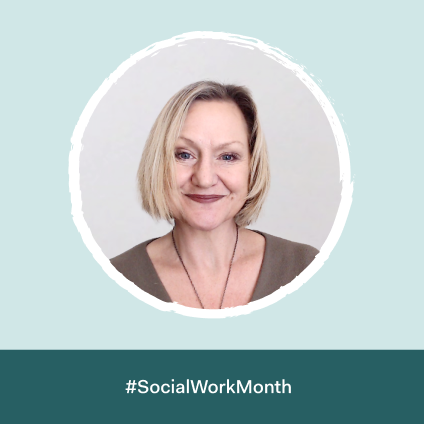Every March, we join the National Association of Social Workers (NASW) in celebrating the contributions that social workers have made to our society. To honor our clinicians, we’re launching a four-part series highlighting two of our licensed clinical social workers at AbleTo. Sharon D. kicks off our series by walking us through her journey from social work to virtual therapy.


By Sharon D., LCSW, AbleTo Clinical Supervisor
I’ve been a social worker for nearly two decades and I can say, without a shadow of a doubt, it’s one of the most rewarding fields out there. There are very few professions that can open up doors to so many opportunities, touch so many lives, and impact so many communities.
I’ve worked with disadvantaged populations and led teams in the ER. I’ve built up community programs in Orange County and mentored social workers. And now, I get to take part in transforming behavioral health care as a Program Advisor at AbleTo.
Every experience, every milestone, and every resolution has defined where I am today.
Why social work?
Like most social workers, I didn’t exactly start out knowing I’d become one. I just knew I had a passion for serving, teaching, and empowering people. I figured a Master’s Degree in Psychology Research and a PhD in Clinical Psychology would help me do all three. But those who knew my personality and curiosity thought otherwise. I was constantly pointed towards social work as an all-encompassing field where I could work in different capacities.
Anywhere you could possibly think of — government agencies, community centers, nonprofit and for-profit companies, policy, schools, etc. — a social worker is needed. And that’s what made this field so compelling. I realized that by following my interests and passions under this vast umbrella of social work, I’d be able to serve so many people and feel fulfilled doing it.
So, I listened to my reliable support system and got a Master’s in Social Work degree. I was confident this was the right decision. 22 years later, I’m still pretty confident it is.
From social work to [virtual] therapy
My journey in social work started at Cal State Long Beach where I learned how organizations provided resources to disadvantaged populations. I worked in Orange County for nearly 20 years and saw every condition across the mental health spectrum.
This experience shaped me, broadened my sense of who people are and what people go through. I learned to look past someone’s diagnosis and define the situation by the solutions, not the problems. What alternatives do they have? How can I connect them with the appropriate resources? I constantly refined this formative outlook throughout my career, eventually becoming a licensed therapist.
I made the decision to go into mental health after doing an internship in physical therapy. After a couple of weeks, I noticed there were two groups of clients — the ones who were getting better and those who weren’t. I was fascinated with the stark contrast in their recovery and found a common thread. So I put on my “researcher hat” and conducted some further observations.
You know what they say about laughter being strong medicine? Well, the ones who were recovering did. They were highly motivated with a positive perception of their lives. They were adaptable, resilient, with an affirmative sense of self. Once I drew this conclusion, I realized these two groups are an example of humanity — the ones who overcome challenges because of their mindsets and the ones who don’t because of their mindsets. I knew I wanted to help people develop the tools they needed to overcome challenges and build healthy habits. Therapy became the perfect avenue to do so.
Around 2013, I started to work with AbleTo and transitioned into providing remote care. I saw first-hand how powerful telemedicine was, especially for patients experiencing barriers to care. In hindsight, it was a great stepping stone into the next chapter of my career. AbleTo gave me the opportunity to do what I love without having the expensive overhead and constraints that came with seeing patients in an office.
“Social workers can see a person’s level of functioning. We’re able to diagnose the root issue, identify the pieces that have been overlooked and empower participants to find (or access) those pieces.”
Empowering patients through Cognitive Behavioral Therapy (CBT)
The most fulfilling aspect of being a therapist has been the connections I get to build with others. It’s an honor to serve as a catalyst in their lives, whether it’s helping them manage a crisis, stressor, chronic condition, or everything in-between. Time and time again, I’ve seen how impactful therapy is in helping a client see their situation through a bird’s eye view. It’s as simple as being present and providing a space to process their thoughts and emotions. Or as transformative as helping them develop life-changing skills. That’s why I enjoy working at AbleTo, where we get to do both as a catalyst to change, growth, and healing.
The Cognitive Behavioral Therapy (CBT) based program we use starts by identifying where the participants are, assessing their needs, and how we can help fill in the gaps. We address barriers to change by educating our participants on how CBT can be activated in their life. Participants are empowered with tools they can use to develop healthy life-long habits.
Making an impact as a clinical supervisor
After a couple years as a part-time virtual therapist at AbleTo, I joined the team as a full-time clinical supervisor (Program Advisor). I had some previous experience navigating management as a supervisor for the county I worked in, but that was a bit different. The county had a lot of “red-tape” and restrictions on a state level that trickled down to the frontline experience. It’s been a complete shift at AbleTo.
Here, we have a nurturing environment that encourages open-mindedness, strategic thinking, and a diversity of perspectives. It’s sort of like being in a “behavioral health think-tank” and it’s beautiful! This leads to an engaged group of therapists and trickles down to the participant experience. That’s why I genuinely believe that resources like AbleTo are at the forefront of addressing the ongoing mental health crisis.
The intersection of social work and the mental health crisis
As the largest providers of behavioral care, social workers play a vital role in addressing the challenges that come with the mental health crisis. I’m fortunate enough to have experience in both (social work and therapy) and I’ve found that the combination of the two has been pivotal in bridging the gap in behavioral health care.
Social workers can see a person’s level of functioning. We’re able to diagnose the root issue, identify the pieces that have been overlooked and empower participants to find (or access) those pieces. Our process is one of consistent problem-solving, educating patients on the tools available to them and empowering them to cultivate those tools for themselves.
I’m not sure what the next chapter of my career holds, but I’m confident that it’ll continue to involve serving, teaching, and empowering others.
Join our community of clinical social workers
Our team at AbleTo is always looking for compassionate clinical social workers who want to make a difference in people’s lives. We’re actively hiring for both part-time and full-time therapists in all 50 states. Check out our career page to learn more.


